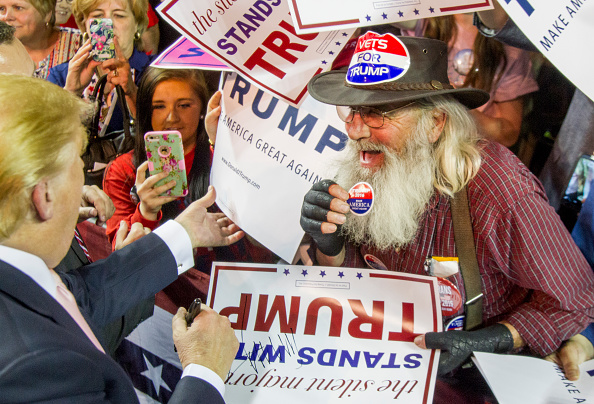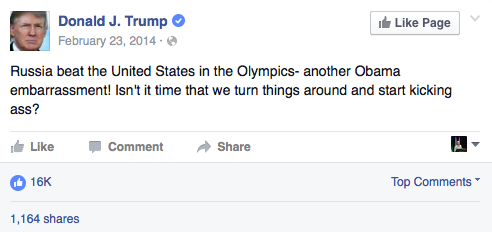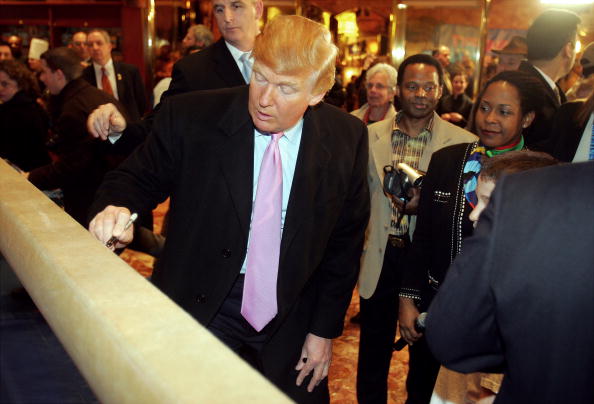In the spirit of Chris Rock at the Oscars on Sunday night, let’s get right to it, the elephant in the room. In this case, the room is decorated with the five Olympic rings and the elephant — ever-so-figuratively, given that he is running for the Republican presidential nomination — is Mr. Donald Trump. Straight talk: if Mr. Trump were to win the general presidential election in November, it’s difficult to draw up a scenario in which that would play well for Los Angeles’ bid for the 2024 Summer Games.
In the 2024 Olympic campaign, Los Angeles would seem, right now, to have a lot going for it. LA has all the ready advantage of being the center of all that is SoCal, plus the huge boost of not having to build hardly anything to get ready for a Games, plus the full attention of the International Olympic Committee's focus on technology and innovation -- California being home to Facebook, Google, Apple, Twitter, Snapchat, Disney and more. Look, if California were a nation, it would boast the world's eighth-largest GDP. And, of course, ridiculously great weather.
All IOC elections are unpredictable. Just the same, LA stands at least a reasonable chance of convincing the IOC to bring the Summer Games back to the United States for the first time since 1996 and Atlanta.
And then there's Mr. Trump.
It is the case that, over the years, Mr. Trump has been linked with elements of the Olympic scene, in particular New York’s bid for the 2012 Games. At the same time, his political rhetoric, and in particular over the past several months, has — this is being gracious — hardly been in keeping with the Olympic values.
The Olympic movement is about building bridges between people. Mr. Trump talks about walls.
At its best, the Olympic movement promotes dialogue, understanding and a more peaceful world. On the campaign trail, Mr. Trump is often about — again, being generous — intolerance.
Here is a prediction:
By September 2017, when the IOC picks its 2024 winner, Hillary Clinton will have been the U.S. president for about eight months. Mrs. Clinton has long shown significant support for the Olympics — as First Lady through the 1990s and then, in 2005, via in-person support as New York senator at the IOC vote at which London won out for 2012. Significantly, Mrs. Clinton has longstanding ties with LA24 bid leader Casey Wasserman and mayor Eric Garcetti.
Los Angeles is vying with three other cities for the 2024 Games: Paris, Rome and Budapest.
Be assured that Mr. Trump is already the subject of much discussion in Olympic circles. Bet that his name comes up many times over at the three-day IOC’s policy-making executive board meeting starting Tuesday in Lausanne, Switzerland.
Bet, too, that Mr. Trump’s political ascent puts the U.S. Olympic Committee and the LA24 people in a delicate position. On the one hand, it’s presidential politics — what is the USOC or LA24 to do? (Answer to rhetorical question: nothing.) On the other, it’s American politics, which carries a disproportionate weight, the U.S. president nominally being leader of the free world, and all that.
Keep in mind, always, that the IOC is European-dominated. Thanks to a round-up published Monday in the New York Times, we can be perfectly clear that Mr. Trump "elicits shock and biting satire" in any number of European nations, including Germany (Der Spiegel front cover, “Madness: America’s agitator”), Britain (580,000 sign petition seeking to ban him from the country), France (Liberation: “Trump, From Nightmare to Reality”) and Spain (letter from imaginary 16th-century king to Trump advising him to “consider bringing back the Inquisition”).
Jean-Marie Le Pen, the 87-year-old founder of the far-right French National Front, who as recently as last year referred to the Holocaust as a “detail” in the history of World War II, had this to say Saturday on Twitter:
https://twitter.com/lepenjm/status/703625793814003712
Translation: “If I were American, I would vote for Donald Trump … but may God protect him!”
Mr. Trump has a “budding bromance” with Russian president Vladimir Putin, according to that same article in the Times, citing — among others — favorable comments on RT, the Kremlin-funded broadcaster.
For those who might be unfamiliar, Mr. Putin is by any measure one of the most important figures in the Olympic and international sports scene. That’s what happens when 1. you are the president of Russia, 2. you spearhead the spending of a reported $51 billion to organize the 2014 Winter Games and 3. you are in line to stage the 2018 soccer World Cup.
It’s no secret President Obama is not a significant personality in the Olympic world. After campaigning in person in 2009 at the IOC vote in Copenhagen at which Chicago, the president’s home town, went out first, Rio ultimately prevailing, the president seemingly has had enough of the IOC. Recall the politically charged delegation President Obama sought to send to Sochi? Featuring, among others, Billie Jean King (who ultimately made the closing ceremonies)?
Maybe that helps explain the Russian love for Trump. Then again, maybe the Kremlin ought to take a second look at Mr. Trump’s Facebook account. Here, from just after those Sochi Games, and does this express the foundational Olympic values — friendship, excellence, respect — or what?
Who knows, of course, what a Trump presidency — perish the thought — might really mean for the Olympics? Mr. Trump, for those keeping track of his Olympic connections, ran with the Olympic torch in New York on June 19, 2004.
As part of the New York bid, Mr. Trump appeared in a 2002 film that played at least a small role in the USOC decision to pick New York — over San Francisco — as the 2012 U.S. entrant. Later, as the New York campaign rolled along, he was photographed signing a balance beam.
He also opted last summer on Twitter to weigh in on Boston’s failed 2024 effort:
https://twitter.com/realDonaldTrump/status/625816370849181696
Heading into the Super Tuesday series of primary elections, Mr. Trump may well be in position to win the Republican nomination.
But the odds of him winning the general election are about as likely as that 9/11 tale he tells in which “thousands and thousands of people” — in New Jersey, with a “heavy Arab population” — “were cheering as that building,” referring to the World Trade Center tower, “was coming down.” That never happened.
About as likely as his plan for a wall to go up between Mexico and the United States, and Mexico paying for it — as if, former Mexican president Vicente Fox saying, “I’m not going to pay for that fucking wall,” and offering this about Trump, among other things, “I mean, he reminds me of Hitler.”
Speaking of references to fascists, here is Trump himself favorably retweeting a post — from, as it turned out, a parody account — that included a quote widely attributed to Mussolini.
https://twitter.com/realDonaldTrump/status/703900742961270784
In the end, the odds of Mr. Trump winning are about as likely as the real-ness of another urban legend he has related, about Muslim extremists being killed by a World War I-era general with bullets that had been dipped in pig’s blood. That never happened.
There are many, many reasons not to vote for Mr. Trump. On the campaign trail, he has revealed himself to be a racist, a bully, a misogynist, a serial liar, someone who throws insults at the handicapped and the Pope and decries the press — and much, much more.
None of this seems to have made a significant imprint in certain precincts of the American electorate, where anger and discontent are manifest.
If you went to public high school — guilty — you come to understand, maybe even just by looking around each morning in home room, the delight in the American system: when you turn 18, and if you register, you get to vote. As the former LA Times columnist T.J. Simers used to love to say, these people live among you.
Even so, for presidential voting purposes, these are the real questions: how many morons are out there, and how many of those morons will actually vote?
The Onion, the satirical news site, put it this way in a story posted Tuesday, a report on a made-up 36-year-old delivery driver from Youngstown, Ohio: " 'I'm Trump All the Way,' Says Man Who Will Die from Mishandling Fireworks Months Before Election."
As Bill James, the father of sabermetrics, the empirical analysis of baseball, put it in a recent blog post, referring to Trump’s status as reality-TV star for the last 20 years and expertise at attracting media attention:
“Trump gets a grossly disproportionate share of the attention, and thus a disproportion share of the idiot vote.”
James also wrote:
“I don’t think that Trump can win, frankly, because I don’t think there are enough morons to elect him. A certain percentage of the American public is just morons; that’s the way it is.”
During this primary season, as James makes clear, the other Republican candidates are playing right into Trump’s hands. What Trump is doing is winning a plurality of a Republican electorate divided multiple ways — that is, at least until after Tuesday, there are still five guys in the race, one of whom, Dr. Ben Carson, has a less-than-zero chance of winning.
This fractionality is essential to understanding what’s going on, as James outlines:
“When you divide the public in two and then divide the voters in one of those halves among five candidates or more, a candidate can win by dominating the moron vote because it only takes about one-seventh of the total population to take the ‘lead’ under those circumstances. But when you’re talking about needing 51 percent of the whole population, rather than needing 30 percent of half of the population, you run out of morons. I hope we will; I hope Trump will lose because I hope that he runs out of morons to vote for him.”
President Obama may not be a big hit in the Olympic world, but he — and President Reagan, too — understood better than almost anyone in the past several decades what a presidential election is about.
It’s not fear, Mr. Trump’s calling card.
It’s hope.
That is the essence of the Olympic spirit, too, and it’s why the election this season of Mrs. Clinton — for all her debate-worthy flaws — is so important.
"Despite what you hear, we don’t need to make America great again — America hasn’t stopped being great. But we do need to make America whole again," Mrs. Clinton said Saturday in South Carolina, mocking Trump's campaign slogan, as the website The Hill reported.
"Instead of building walls, we need to be tearing down barriers. We need to show, by everything we do, that we really are in this together.”















